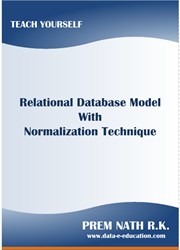

- Relational Algebra Operators
-
- Operators and Symbols
- Selection Operator
- Projection Operator
- Cartesian Product Operator
- Natural Join Operator
- Theta Join Operator
- Left Outer Join Operator
- Right Outer Join Operator
- Full Outer Join Operator
- Division Operator
- SET Union Operator
- SET Difference Operator
- SET Intersection Operator
- Rename Operator
Domain Integrity Constraints
Domain is a set of atomic data values with unique data type in the Relational Database. Domain Constraints is used to implicitly validate data when Insert or Update Record(s) in the Relational Database. Not Null, Default and Check are Domain Integrity Constraints.
Not Null Constraint
NULL is a unique mark in the SQL that indicate data value does not exist in the Database. NULL concept was introduced by Dr.E.F. Codd to represent missing data in the Relational Database Model. By default, all columns can store with NULL data value in the Relational Database. NOT NULL Constraint is used define in the mandatory column that absolutely needs data value.
Default Constraint
Default Constraint is used to define a default literal Number, String, Date, UID or SQL Function Data in the mandatory column when does not define particular column data in the Table of Relational Database. Default Data must be match with Data Type and Range of the mandatory column or must be convert the Data Type and then store data in the mandatory column.
Check Constraint
Check Constraint is used to define a Logical Expression that valid data when Insert or Update Data in a Table of Relational Database.
Domain is a set of atomic data values with unique data type in the Relational Database. Domain Constraints is used to implicitly validate data when Insert or Update Record(s) in the Relational Database. Not Null, Default and Check are Domain Integrity Constraints.
Not Null Constraint
NULL is a unique mark in the SQL that indicate data value does not exist in the Database. NULL concept was introduced by Dr.E.F. Codd to represent missing data in the Relational Database Model. By default, all columns can store with NULL data value in the Relational Database. NOT NULL Constraint is used define in the mandatory column that absolutely needs data value.
Default Constraint
Default Constraint is used to define a default literal Number, String, Date, UID or SQL Function Data in the mandatory column when does not define particular column data in the Table of Relational Database. Default Data must be match with Data Type and Range of the mandatory column or must be convert the Data Type and then store data in the mandatory column.
Check Constraint
Check Constraint is used to define a Logical Expression that valid data when Insert or Update Data in a Table of Relational Database.
|
|
Copyright © 2010 data-e-education.com. All rights reserved.
